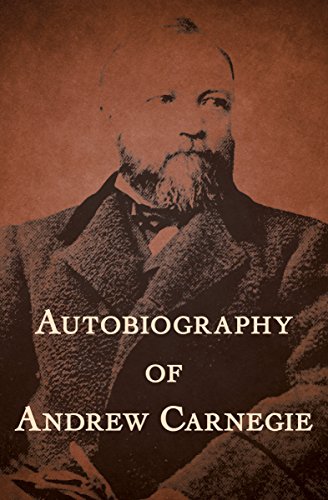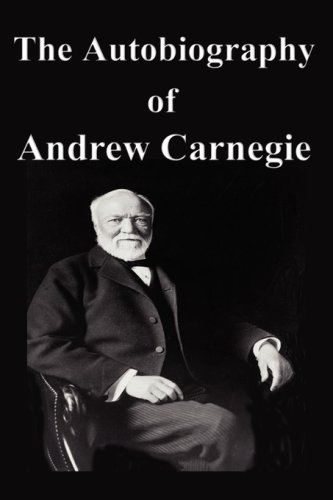-
Autobiography of Andrew Carnegie
Andrew Carnegie, John Charles Van Dyke
eBookThis book was converted from its physical edition to the digital format by a community of volunteers. You may find it for free on the web. Purchase of the Kindle edition includes wireless delivery.
-
Autobiography of Andrew Carnegie
Andrew Carnegie, John Charles Van Dyke
language (, March 30, 2011)This book was converted from its physical edition to the digital format by a community of volunteers. You may find it for free on the web. Purchase of the Kindle edition includes wireless delivery.
-
The Autobiography of Andrew Carnegie
Andrew Carnegie, Antony Ferguson, Tantor Audio
Audiobook (Tantor Audio, May 10, 2012)Andrew Carnegie was an immigrant, a poor boy who worked in a cotton mill, a man who amassed a great fortune as a steel baron and then became one of the most generous and influential philanthropists the world has ever known. His famous dictum, that he who dies rich dies disgraced, has inspired philanthropists and philanthropic enterprises for generations. During his own lifetime, he put his ideas into action by creating a family of organizations that continue to work toward improving the human condition, advancing international peace, strengthening democracy, and creating societal progress that benefits men, women, and children in the United States and around the globe.Here, in his own words, Mr. Carnegie tells the dramatic story of his life and career, outlining the principles that he lived by and that today serve as the pillars of modern philanthropy.
-
The Autobiography of Andrew Carnegie and the Gospel of Wealth
Andrew Carnegie, Gordon Hutner
Mass Market Paperback (Signet, Nov. 7, 2006)The enlightening memoir of the industrialist as famous for his philanthropy as for his fortune. His good friend Mark Twain dubbed him “St. Andrew.” British Prime Minister William Gladstone called him an “example” for the wealthy. Such terms seldom apply to multimillionaires. But Andrew Carnegie was no run-of-the-mill steel magnate. At age 13 and full of dreams, he sailed from his native Dunfermline, Scotland, to America. The story of his success begins with a $1.20-a-week job at a bobbin factory. By the end of his life, he had amassed an unprecedented fortune—and given away more than 90 percent of it for the good of mankind. Here, for the first time in one volume, are two impressive works by Andrew Carnegie himself: his autobiography and “The Gospel of Wealth,” a groundbreaking manifesto on the duty of the wealthy to give back to society all of their fortunes. And he practiced what he preached, erecting 1,600 libraries across the country, founding Carnegie Mellon University, building Carnegie Hall, and performing countless other acts of philanthropy because, as Carnegie wrote, “The man who dies thus rich dies disgraced.” With an Introduction by Gordon Hutner
-
The Autobiography of Andrew Carnegie & The Gospel of Wealth
Andrew Carnegie, David McCallion, A.R.N. Publications
Audible Audiobook (A.R.N. Publications, Oct. 24, 2017)During the great industrial age, Andrew Carnegie was in a class of his own. Also known as a great steel baron, Carnegie believed in investing in philanthropic causes and the future of mankind. One of Carnegie's most notorious sayings was that any man that dies rich - dies disgraced. Although born in Scotland, Andrew Carnegie immigrated to the United States with his parents as a young child. He began his climb to the top as a modest errand boy and eventually moved into the steel industry. By the time he was an adult, Carnegie was one of the richest men in the country. Known as a generous man, he spent a great deal of his fortune investing in organizations that aimed to advance social progress and improve conditions for people of all classes. Andrew Carnegie was also intensely interested in world peace and the security of democracy.
-
Autobiography of Andrew Carnegie
Andrew Carnegie
language (Open Road Media, Sept. 22, 2015)A critically acclaimed autobiography that exemplifies the American Dream by one of nineteenth-century America’s most philanthropic businessmen. Scottish immigrant Andrew Carnegie worked his way up from bobbin boy to telegraph operator to railroad man, learning key lessons along the way that would eventually lead to his unparalleled success in the steel business. Documenting a world of tariffs, insider deals, and Wall Street sharks, The Autobiography of Andrew Carnegie opens a window into the great industrialist’s decision-making process. His insights on education, business, and the necessity of giving back for the common good set an inspirational example for aspiring executives and provide a fitting testament to the power of the American dream. This ebook has been professionally proofread to ensure accuracy and readability on all devices.
-
The Autobiography of Andrew Carnegie
Andrew Carnegie
Hardcover (FQ Classics, Sept. 17, 2007)After retiring from active business, Andrew Carnegie yielded to the earnest solicitations of friends, both in the United States and in Great Britain, and began to jot down from time to time recollections of his early days. He soon found, however, that instead of the leisure he expected, his life was more occupied with affairs than ever before, and the writing of these memoirs was reserved for his play-time in Scotland. For a few weeks each summer we retired to his little bungalow on the moors at Aultnagar to enjoy the simple life, and it was there that Mr. Carnegie did most of his writing. He delighted in going back to those early times, and as he wrote he lived them all over again. This book is a must read for those interested in the life of this important business leader, and this is a book which contains many great stories and lessons from the life of Andrew Carnegie in his own words and in his own buoyant style.
-
Autobiography of Andrew Carnegie
Andrew Carnegie
language (Prabhat Prakashan, Aug. 6, 2016)This is the autobiography by the richest man of his time; after Rockfeller; who donated most of his fortune to establish schools and universities in many countries.
-
Autobiography of Andrew Carnegie
Andrew Carnegie
language (, Jan. 14, 2014)This book is an illustrated version of the original Autobiography of Andrew Carnegie by Andrew Carnegie. “After retiring from active business my husband yielded to the earnest solicitations of friends, both here and in Great Britain, and began to jot down from time to time recollections of his early days. He soon found, however, that instead of the leisure he expected, his life was more occupied with affairs than ever before, and the writing of these memoirs was reserved for his play-time in Scotland. For a few weeks each summer we retired to our little bungalow on the moors at Aultnagar to enjoy the simple life, and it was there that Mr. Carnegie did most of his writing. He delighted in going back to those early times, and as he wrote he lived them all over again. He was thus engaged in July, 1914, when the war clouds began to gather, and when the fateful news of the 4th of August reached us, we immediately left our retreat in the hills and returned to Skibo to be more in touch with the situation.”
-
The Autobiography of Andrew Carnegie and The Gospel of Wealth
Andrew Carnegie, Gordon Hutner
eBook (Signet, Nov. 7, 2006)The enlightening memoir of the industrialist as famous for his philanthropy as for his fortune. His good friend Mark Twain dubbed him “St. Andrew.” British Prime Minister William Gladstone called him an “example” for the wealthy. Such terms seldom apply to multimillionaires. But Andrew Carnegie was no run-of-the-mill steel magnate. At age 13 and full of dreams, he sailed from his native Dunfermline, Scotland, to America. The story of his success begins with a $1.20-a-week job at a bobbin factory. By the end of his life, he had amassed an unprecedented fortune—and given away more than 90 percent of it for the good of mankind. Here, for the first time in one volume, are two impressive works by Andrew Carnegie himself: his autobiography and “The Gospel of Wealth,” a groundbreaking manifesto on the duty of the wealthy to give back to society all of their fortunes. And he practiced what he preached, erecting 1,600 libraries across the country, founding Carnegie Mellon University, building Carnegie Hall, and performing countless other acts of philanthropy because, as Carnegie wrote, “The man who dies thus rich dies disgraced.” With an Introduction by Gordon Hutner
-
Autobiography of Andrew Carnegie
Andrew Carnegie
language (Didactic Press, July 29, 2014)THE story of a man's life, especially when it is told by the man himself, should not be interrupted by the hecklings of an editor. He should be allowed to tell the tale in his own way, and enthusiasm, even extravagance in recitation should be received as a part of the story. The quality of the man may underlie exuberance of spirit, as truth may be found in apparent exaggeration. Therefore, in preparing these chapters for publication the editor has done little more than arrange the material chronologically and sequentially so that the narrative might run on unbrokenly to the end. Some footnotes by way of explanation, some illustrations that offer sight-help to the text, have been added; but the narrative is the thing.This is neither the time nor the place to characterize or eulogize the maker of "this strange eventful history," but perhaps it is worth while to recognize that the history really was eventful. And strange. Nothing stranger ever came out of the Arabian Nights than the story of this poor Scotch boy who came to America and step by step, through many trials and triumphs, became the great steel master, built up a colossal industry, amassed an enormous fortune, and then deliberately and systematically gave away the whole of it for the enlightenment and betterment of mankind. Not only that. He established a gospel of wealth that can be neither ignored nor forgotten, and set a pace in distribution that succeeding millionaires have followed as a precedent. In the course of his career he became a nation-builder, a leader in thought, a writer, a speaker, the friend of workmen, schoolmen, and statesmen, the associate of both the lowly and the lofty. But these were merely interesting happenings in his life as compared with his great inspirations—his distribution of wealth, his passion for world peace, and his love for mankind...
-
Autobiography of Andrew Carnegie
Andrew Carnegie, John Charles Van Dyke
language (Good Press, Nov. 19, 2019)"Autobiography of Andrew Carnegie" by Andrew Carnegie. Published by Good Press. Good Press publishes a wide range of titles that encompasses every genre. From well-known classics & literary fiction and non-fiction to forgotten−or yet undiscovered gems−of world literature, we issue the books that need to be read. Each Good Press edition has been meticulously edited and formatted to boost readability for all e-readers and devices. Our goal is to produce eBooks that are user-friendly and accessible to everyone in a high-quality digital format.